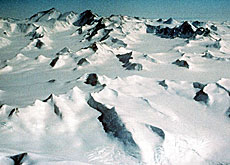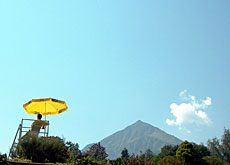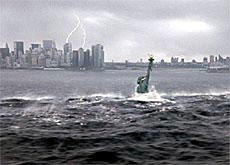World will not freeze again for 15,000 years

The next ice age is not due for at least 15,000 years, according to research published by a team of Swiss and European climatologists in the scientific journal, “Nature”.
The findings are based on research conducted by drilling three kilometres below the surface of the ice in Antarctica.
The European Project for Ice Coring in Antarctica (Epica) has been testing the ice in a bid to trace the pattern of global climate change over a period of thousands of years.
Epica scientists claim that tests on the ice have allowed them to “go back 740,000 years in the past” and to discover that the world has had eight ice ages over the intervening centuries.
Frozen in time
It has been 12,000 years since the end of the last ice age. According to research conducted in Antarctica, we are currently living through one of the longest warm periods in 420,000 years.
Those involved in the Epica project say that the mild climate will continue for another 15,000 years.
Scientists from ten European countries have been working on the eight-year research programme.
Thomas Stocker, a professor of climatology at Bern University and a member of Epica’s Scientific Steering Committee, says the information extracted from the centuries-old ice can also be used to predict what impact greenhouse gas emissions are having on the global climate.
“The concentration of carbon dioxide is higher than it has been in 500,000 years,” said Stocker, adding that the findings were based on experiments conducted on gas trapped in the ice.
Extracting air
Stocker and his fellow researchers now plan to extract air from tiny bubbles in the ice to determine how the atmosphere’s composition has varied.
By studying past climate patterns, the team hopes to get a better idea of future trends and how atmospheric conditions will influence them.
The team of scientists have already set themselves the task next winter of drilling a further 100 metres in one of the most hostile places on the planet to reach ice that is 900,000 to one million years old.
Drilling is limited to just two months of the year, December and January, because the average annual temperatures are below -54 degrees Celsius.
swissinfo with agencies
The scientists have to endure temperatures as low as -40 degrees Celsius.
The ice core is the deepest and oldest ever extracted.
The research team is working 1,000km away from the nearest Antarctic outpost.

In compliance with the JTI standards
More: SWI swissinfo.ch certified by the Journalism Trust Initiative


You can find an overview of ongoing debates with our journalists here. Please join us!
If you want to start a conversation about a topic raised in this article or want to report factual errors, email us at english@swissinfo.ch.